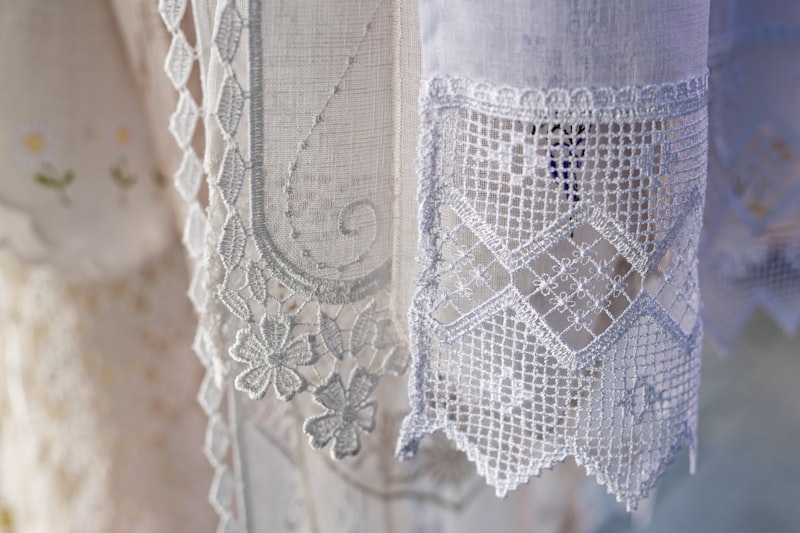Unveiling the Symbolic Meanings Behind Lace Patterns in Weddings
Unveiling the Symbolic Meanings Behind Lace Patterns in Weddings
Introduction to Lace Patterns in Weddings
When it comes to weddings, every detail counts. From the venue to the attire, each element plays a crucial role in the overall theme and ambiance of the special day. Among these elements, lace patterns have a unique charm and significance that can often be overlooked. This article delves into the symbolic meanings behind lace patterns in weddings, exploring their historical context, cultural impact, and emotional resonance.
Historical Background of Lace
Lace has a rich history that dates back to the 16th century when it first gained popularity in Europe. Originally handcrafted by artisans, lace was a symbol of wealth and sophistication. By the 19th century, lace became a staple in bridal fashion, often adorning the gowns of brides, symbolizing purity and elegance.
Types of Lace Patterns and Their Meanings
There are various types of lace patterns used in wedding attire, each carrying its own significance. Let's explore some of these designs:
| Lace Type | Symbolic Meaning |
| Chantilly Lace | Elegance and Romance |
| Venise Lace | Richness and Heritage |
| Battenburg Lace | Comfort and Innocence |
| Alençon Lace | Tradition and Artistry |
The Cultural Significance of Lace Patterns
In many cultures, lace is more than just a decorative element; it's woven into the fabric of traditions and rituals. For example, in Western cultures, the use of lace in wedding dresses symbolizes the bride's purity and commitment. Conversely, in other cultures, lace might signify a connection to ancestry, representing familial ties and generational blessings.
Romantic Associations with Lace
Lace patterns often evoke feelings of romance and nostalgia. The intricate designs can remind couples of their love story, highlighting the delicate yet strong bonds they share. Using lace in wedding decorations—such as table settings, invitations, or even cake designs—can create an ambiance filled with sentimentality and beauty.

Modern Trends: Lace in Contemporary Weddings
Today, lace continues to be a beloved choice for brides around the world. Many contemporary weddings incorporate lace in innovative ways. Whether through layered lace gowns, lace veils, or lace accents in reception decor, the patterns continue to symbolize sophistication and timeless love.
Incorporating Lace into Wedding Themes
Integrating lace patterns into wedding themes can enhance the overall aesthetics. Here are some ideas on how to stylize your wedding with lace:
- Lace Invitations: Use lace motifs or laser-cut lace designs on your wedding invitations to set a romantic tone from the start.
- Lace Table Decor: Incorporate lace table runners or overlays to add texture and charm to your reception tables.
- Lace Flowers: Consider lace-wrapped bouquets or lace-themed floral arrangements to tie in the lace motif throughout the event.
Emotional Connections: Personalizing Lace Patterns
Many couples choose to personalize their lace designs, adding unique touches that reflect their love story. For instance, a family heirloom lace piece can be sewn into the bride's gown, symbolizing the continuity of love through generations.
Understanding Different Lace Patterns in Relation to Personal Stories
Couples can also pick lace patterns based on personal significance. For example, if a couple has a particular memory associated with a floral lace, they might include it in their wedding decor to reflect their journey together. As lace evolves in design, so does its meaning, making each wedding uniquely special.
Conclusion: Embracing the Symbolic Meanings of Lace
In summary, the symbolic meanings behind lace patterns in weddings extend far beyond their aesthetic appeal. Understanding the historical, cultural, and emotional significance of lace can enrich the wedding experience for couples and their families. Whether through intricate lace designs on gowns, decor, or other elements, lace continues to symbolize love, commitment, and elegance. As you plan your special day, consider how you can incorporate these symbolic meanings of lace into your own wedding narrative.
Remember, selecting the right lace pattern is about more than appearance; it’s an opportunity to express your love story and honor traditions that mean something special to you. Happy planning!
